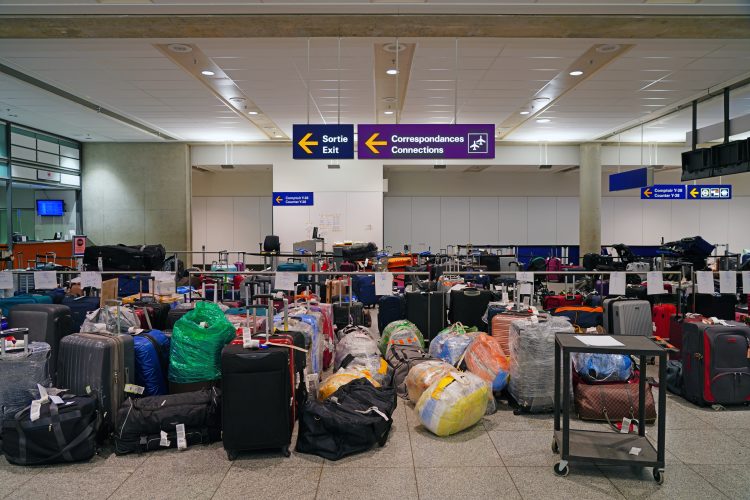The challenges of the new era of baggage handling
- Like
- Digg
- Del
- Tumblr
- VKontakte
- Buffer
- Love This
- Odnoklassniki
- Meneame
- Blogger
- Amazon
- Yahoo Mail
- Gmail
- AOL
- Newsvine
- HackerNews
- Evernote
- MySpace
- Mail.ru
- Viadeo
- Line
- Comments
- Yummly
- SMS
- Viber
- Telegram
- Subscribe
- Skype
- Facebook Messenger
- Kakao
- LiveJournal
- Yammer
- Edgar
- Fintel
- Mix
- Instapaper
- Copy Link
Posted: 5 September 2023 | Sara Branco | No comments yet
For International Airport Review’s Issue 2 2023, Sara Branco, Baggage Handling Expert at Geneva Airport, looks back on 2022’s baggage chaos and discusses IATA’s Resolution 753 which is due to come into effect this year.


Collection of baggage Montreal Pierre Elliott Trudeau International Airport (YUL). CREDIT; GENEVA AIRPORT
Summer 2023 is coming and with it the various globetrotters that are longing to take their flights to see the wonders this world has to offer. From check-in, to baggage handling, from ramp to cargo, crews and staff, all the right people at the right place make sure that you can fly! And although the well-known quote, “Not all those that wander are lost” fits perfectly to the majority of our guests, we can’t, unfortunately, say the same about their luggage!
I recently received an invitation to speak about the risk management in baggage handling at the 10th Emergency Management for Airports Summit and this is a summary of what I had to say:
Summer of 2022
After a two-year slowdown in the industry, we were eager to fly again and meet one another, but unfortunately, those where not the images broadcasted last summer.
Instead, we saw images of baggage pile ups at airports around the world on the news. How can we explain those images of hundreds of pieces of luggage left lying around the terminals? Hundreds of passengers expecting their bags at arrival not understanding the reasons why they made it to the other side of the world, but their bags did not. Anticipating the wait, the time and the bureaucracy that Lost & Found procedures take, the heavy height of this brought several airports to a level of emergency that was unexpected.
How could this return to normalcy so severely affect daily operations? Why didn’t we anticipate the risk of this much-wanted recovery after two years of pandemic-induced travel bans? The aftermath of this troubled news is as heavy to carry as the 23kg bag to be charged in the last row of an ULD container.
How can we learn, anticipate and recover from it? Is it unpreparedness? Is it a lack of staff? Is it the lack of trust or faith in the industry retrieval? Why didn’t we anticipate it? Well… We did!
Almost one year later, in the aftermath, we can easily identify the root causes and manage the disruption before it turns into chaos; what happened last summer will not be repeated.
The analysis
Despite the continuous cycle of planning, organising, equipping, exercising, evaluating and training to improve activities, since 2020, airports have lost workers with the expertise, know-how and the capability of problem solving. Consequently, we had to face the return to normality without those precious resources.
The path followed since has allowed us to reinforce those weak strings and go back to the routine numbers that we were used to in 2019. It has also allowed us to train and properly regain the expertise and knowledge needed to perform efficiently.
These levels of expertise and know-how are powerful tools that can only be obtained by analysing, testing and putting to exercise what was learned. That means that workers cannot only be taught, they need to learn, test and put into practice!
The numbers
According to SITA, baggage systems and baggage teams handle more than 4.5 billion bags every year. These numbers that are expected to grow and by double by 2036, according to IATA. This will create a strain on the existing systems and teams will need to find ways to work more efficiently and effectively.
According to SITA, baggage systems and baggage teams handle more than 4.5 billion bags every year. These numbers are expected to grow and be double by 2036, according to IATA. This will create a strain on the existing systems and teams will need to find ways to work more efficiently and effectively
In June, IATA’s Resolution 753 will require its members (83% of the global air traffic) to comply with baggage tracking until the end of the year. This adds a layer of difficulty to ground operations, due to the heavy need of understanding and rebuilding that the new compliance demands.
However, it also allows airports, airlines and ground handlers to be more effective, resourceful and liable. This resolution will permit us to follow and track the bags at key points and respond efficiently to baggage disruptions.
According to a recent report by flight compensation firm Claim Compass, 5% of the 4.8 billion bags handled are irretrievably lost. This is a huge amount of bags that will never get to arrivals.
The implementation of IATA Resolution 753 allows us to collect data that will be combined, at one point, with the newest, most powerful and efficient AI tools. These tools will allow us to minimise loss of luggage and optimise work environments, enabling us to track the bags systematically, treat the information, and give it effectively to the airlines. Therefore, we, as a connected all, will definitely provide a deeper understanding of the integrity of the baggage handling system, be able to grant a better service, reduce the numbers of mishandled bags, and perform at our best.
The four key points of tracking, per Resolution 753, are check-in, ramp, delivery to transfer and arrivals. This means that as soon as you give your bag at check-in, until it returns to you at arrivals at your final destination, your bag will be tracked and traceable. The recollection of the data provided by those key points of tracking can be easily shared with the airline, ground handlers and even passengers so you can effectively know where your bag is at all times.
In today’s fast-paced and over-connected world, travellers, airlines and ground handlers expect a seamless experience from booking to arrival. Airports must therefore adapt, upgrade and follow the trends to be as responsive as they are expected to be. For that, airports must adapt, convene, and modify procedures and infrastructures, and increase the capability of response to follow-up the demands and mobilisation that this IATA resolution 753 compliance demands.
Moreover, we surely will do so our passengers and airlines, as well as our ground handlers, can rely on us to connect travellers throughout the world without the worry of losing their bags!


About the author
From check-in to gate, from supervision to management, from a multi-national ground company, to a Geneva Airport employee, Sara Branco has more than 10 years of expertise in aviation. Her expertise is required in the challenging project of implementing a new baggage system compliant with the new security standards.
Issue
Related topics
Baggage handling, Economy, Ground handling, Operational efficiency


















